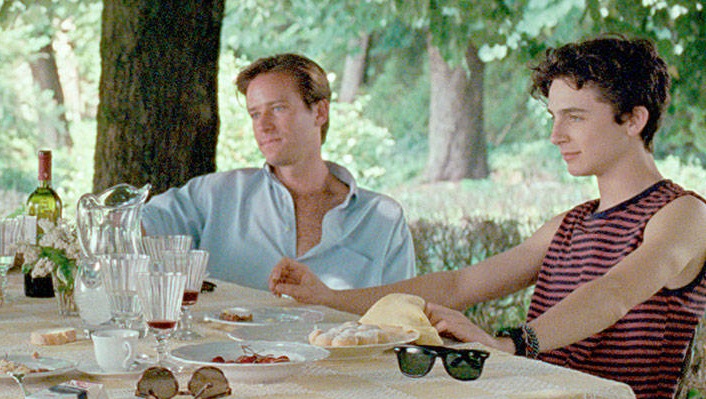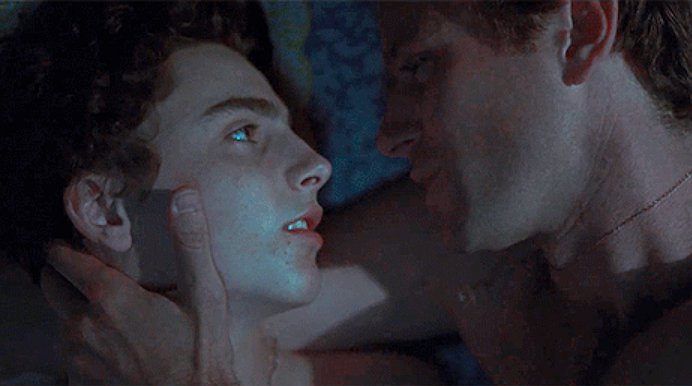Timothée Chalamet and Armie Hammer tell Attitude how ‘Call Me By Your Name’ has helped fans come out
The Oscar-winning gay romance is finally out on DVD this week.
By Will Stroude

Sitting down in a London hotel to talk to Attitude about the Blu-ray and DVD release of Call Me By Your Name, Timothée Chalamet and Armie Hammer are understandably enthused about the little film that’s made a big splash on the awards circuit.
The beautiful love story between Timothée’s bored 17-year-old Elio and Armie’s older Oliver, an American who comes to stay at the family’s Italy home and ignites Elio’s passions, has been feted with five-star reviews and an avalanche of awards.
Bagging the Critics’ Circle best actor trophy a couple of hours after our chat, Chalamet was also nominated for an Oscar, and the impossibly handsome Hammer has been praised for a delicate performance that’s a million miles from blockbusters like The Lone Ranger and The Man From U.N.C.L.E.
Buzzed about all the accolades, they’re especially moved by how the film has resonated so profoundly with the LGBTQ community.

How important are all the nominations and awards in terms of bringing attention to a film like Call Me By Your Name?
Armie: All the awards attention is certainly unexpected. We didn’t make this tiny little movie in the Italian countryside thinking we’d still be talking about it a year after we first started to promote it. I think the awards talk and all of the love for the film is important because people should see this movie. I think it’s a valuable piece of art and it’s a wonderful thing in a world that seems increasingly scary to have a film that celebrates love.
From the feedback you’ve had, why do you feel the film has resonated so much within the LGBTQ community?
Armie: One of the best things I’ve come across is that someone on social media posted “I watched your film, I went home and I came out to my parents”. I don’t know that I’m necessarily naïve enough to think that film can change the world but it definitely changed that guy’s world. We made a film about self-acceptance and a celebration of love and, to borrow a direct line from the movie, is it better to speak or to die? He chose to speak and that’s a beautiful thing.
Timothée, have you encountered similar reactions?
Timothée: Our producer Peter Spears just sent this to me [quoting from a social media post]: “I came out to my mum about a year ago and I always felt she didn’t accept it 100% and I felt like me talking about my sexuality made her uncomfortable. When we watched Call Me By Your Name together god, it was really magical to me. I asked what she thought and she was like ‘It was beautiful, really beautiful’ and she talked and talked and hearing her talk about the movie made me so happy. I really felt like we became so much closer thanks to Call Me By Your Name. This film means so much to me and now I feel much more secure about talking about my sexuality with her. I know she’ll support me no matter what. I love this movie so much I’m crying.”

How does such an emotional response make you feel?
Timothée: When you read stuff like that it really gives me goosebumps. It makes me want to pinch myself because that’s really the dream as an artist.
Luca has talked about the idea of a sequel in which Elio might be straight. What does that say about the sexual fluidity of Elio and Oliver?
Timothée: One of the beautiful themes of this movie is how definition-less the love is presented and how sexuality isn’t presented as something that needs to be boxed but rather boys can be with girls, boys can be with boys, girls can be with girls.
Would you be up for revisiting the characters?
Armie: Absolutely. I’d be happy to do anything that involved getting to work with Luca and Timmy again.
Timothée: I’d even operate a boom mic on a Luca movie.

How would you sum up the universal themes of the story?
Timothée: That love is love is love, that self-acceptance is a strong motivator in life and, as Michael Stuhlbarg’s character Mr Perlman says at the end of the movie, that suffering is suffering and any shape or form suffering takes is an acceptable form. The only thing about suffering that’s unacceptable is to hate yourself for it or to beat yourself up for it or to try and extinguish it unnaturally. Live with the pain that comes with love and live with the pain that is inherent in life.
Looking back, what is the most memorable thing about the filming?
Timothée: It’s similar to the tone that Luca’s movies take, where nature bleeds into life and life bleeds into nature. My most favourite memories are just the setting and being immersed in that setting, driving to work one day past Armie, who was riding there on his bike.
Armie: The whole thing has just congealed into one perfect memory that is built up of leisurely but challenging days at work, terrific meals, amazing company, the beautiful countryside, the incredible town we were in, the majestic villa, time with Luca, time with Timmy, time with the cast… It’s all become one terrific memory that to pick just one favourite thing would be impossible.
Was there much rehearsal to achieve the chemistry we see in the film?
Armie: We did one rehearsal at the house. We show up and Luca says ‘Let’s just do a quick rehearsal’. We go out in the backyard and there’s a patch of grass. He goes ‘Why don’t you guys lay down there and just rehearse, I don’t know, scene 72?’ I don’t know if that was the actual number but we flip to the page and we find in the script that it just says ‘Elio and Oliver make out in the grass’. He goes ‘Whenever you’re ready’ so Timmy and I are like ‘OK, let’s do this’. We lay down in the grass, we start making out and he’s like ‘No, no, no, no! More like you feel it, like you mean it’. We’re like ‘OK, alright, let’s do it’ and we start making out again. We’re going and we’re going and we’re going and all of a sudden we look up and Luca has already walked away and left us there in the grass!

How did shooting in chronological order help with your performances?
Armie: It was almost like cheating, instead of needing to have notecards that said ‘Where have I come from, what have I been through, where am I now?’ We got to organically allow the characters’ relationships to grow within the scenes. We’d do a scene where we had our, you know, first kiss and then go immediately into the scene right after having just lived that experience instead of trying to fabricate in our heads what it would have been like and felt like.
Do you feel the bond you formed on the film is something that will last forever? And how would you describe that bond?
Timothée: I hope so. [Laughs] He’s not getting rid of me.
Armie: We went through a beautiful process together in terms of making this film. I feel like if we’d met under other circumstances we’d still be friends but this was a more intense way to realise ‘Hey, I really like this guy’.
Call Me By Your Name is out on DVD and Blu-ray now.
